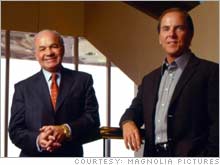Guilty of pleading guilty
Jeff Skilling's lawyer takes on the witnesses for the prosecution in the Enron trial, and it's not pretty.
HOUSTON, Texas (FORTUNE) - A courtroom is a strange mixture of contrasting elements. There's the pomp and circumstance, with a marshal instructing you to "all rise" as the jury enters or leaves the room, and announcing at the start of the day "God save these United States and this honorable court." But there's also a surprising informality. For example, when a witness changes hands from the prosecution to the defense, there's nary a break in proceedings, not even time for a breath.
There's jocularity – Monday's witness in the trial of Ken Lay and Jeffrey Skilling, former Enron investor relations chief Mark Koenig, cracked up the room a few times. ("It was the American Dream, wouldn't you say, " Skilling's lawyer, Daniel Petrocelli, asked Koenig. "Ummm, not now," Koenig replied.) And there are reminders that what is happening in this Houston courtroom is horribly serious, as when Koenig began to cry on the stand when Petrocelli grilled him about his reasons for pleading guilty. Petrocelli was, in effect, arguing that by pleading guilty, Koenig was trying to save some of the millions he got out of Enron for his family. ("Your family didn't want you to lose all your money...") At that point, the judge called a recess. We were all waiting to see what style of questioning Petrocelli and Lay's lawyer, Mike Ramsey, will use when they cross-examine witnesses who have pled guilty to crimes at Enron. After all, the defense position is, in Petrocelli's words, that most of these witnesses are "not guilty of the crimes that they pled guilty." Guilty only of pleading guilty?
If you think that means they'll take a gentle tone, though, think again: Petrocelli was sharp and relentless. "I would like to talk about your honesty, your candor, your fairness," he began. On the stand, Koenig visibly bristled more than once in response to Petrocelli's accusations. After the recess, he made a point of answering Petrocelli's question. "It is hard to tell your kids" that you've pled guilty to a crime, Koenig said. "I'm over the big fear." In other words, the government was not much to be scared of after he'd had to face his children. Another reporter speculates that Lay's lawyer, Mike Ramsey, will play the good cop to Petrocelli's bad cop. We'll find out today. Petrocelli spent most of the day questioning Koenig about the meaning of his "contract" with the government -- he told the jury that the people sitting at the prosecutor's table were the ones who would decide if Koenig had done a "good job" or not -- and the fact that he had repeatedly denied any wrongdoing to various investigators, from the SEC to the examiner sorting out Enron's bankruptcy, before copping his plea in August 2004. If we have to sit through this line of questioning for every witness that is cooperating with the government -- and we likely will -- it will be a long trial indeed. Who knows if the jury will find this effective? But personally, I wanted to hear more about the substance of Koenig's allegations -- in a nutshell, that he and others repeatedly deceived investors about Enron's true financial condition. On this front, Petrocelli did hit several points. For example, under questioning by prosecutor Kathy Ruemmler, Koenig had noted that a substantial portion of Enron's profits in the first two quarters of 2001 came from the non-recurring sale of a specific type of power plant called "peakers." Enron's internal financial documents showed $225 million in revenues from the sale of such plants in the first quarter of 2001, and $412 million in the second quarter, which was a huge portion of the business's profits. But in response to a rambling question from analyst David Fleischer of Goldman Sachs on a conference call, part of which was about the profits from sales of power plants, Skilling gave a long answer about why asset sales should be considered part of recurring earnings, and then said "and so, David, we don't even track that." Under cross-examination, Koenig pointed to that episode as a specific example of when Skilling had misled an analyst. But Petrocelli pointed out that there were also costs associated with those hundreds of millions in revenues, and he got Koenig to admit that he didn't know what those costs were. Skilling's "that," Petrocelli said -- or I should say I think he said, because I lost track of what "that" meant, which was probably the point -- referred to the amount made from the peakers after the costs were deducted, and therefore, following this logic, Skilling didn't lie to the analyst, because Koenig can't prove that Skilling knew what the profit after the associated costs was. (Got it?) "There's no way I can know exactly what he was thinking," Koenig finally conceded. In common sense terms, it's hard to look at this episode as anything other than Skilling giving less than full disclosure of the gain from the peaker plant sales. But did he lie? Maybe not, in the strictest definition of what it is to lie. (Remember former President Clinton's famous quote: "I did not have sex with that woman.") Will the jury buy Petrocelli's argument? Maybe. Another reporter pointed out to me that that sort of hairsplitting by the defense team worked well in the earlier Enron broadband trial -- which ended with a hung jury on most counts. Still, for those of us who dealt with Enron in the glory days, that wiggling -- ask a simple question, get a less than candid response -- was precisely what was so infuriating about the company.
I don't know if Skilling or Lay are guilty of crimes. I really don't. But watching Petrocelli split those hairs in a courtroom sure makes me mad all over again. |
| |||||||||||||||||||

